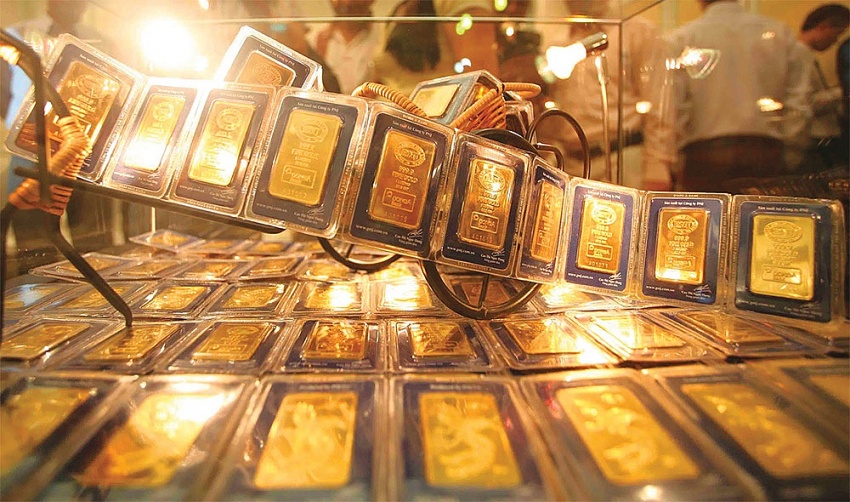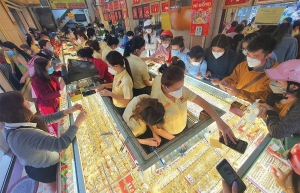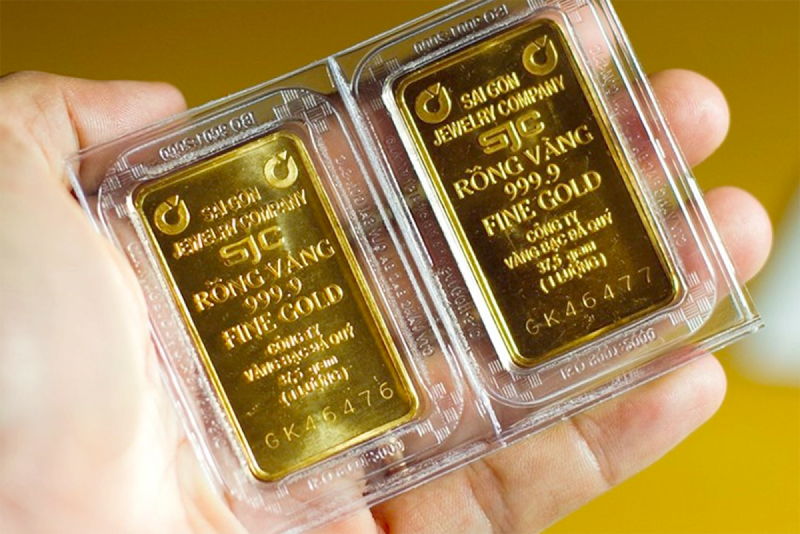Cautious state remains after gold auction
Economist Nguyen Tri Hieu expressed surprise at the underwhelming outcome of Vietnam’s inaugural gold auction on April 23, where most gold remained unsold despite robust market demand.
 |
| Cautious state remains after gold auction |
“The State Bank of Vietnam (SBV) organised an auction for 16,800 taels of gold, but only two entities secured bids for 3,400 taels,” Hieu said.
He attributed the tepid response to the market’s cautious wait-and-see approach, influenced by potential changes to Decree No.24/2012/ND-CP on gold business activities. “The stringent requirement for bidders to purchase a minimum of 1,400 SJC taels also deterred participation, prompting businesses to exercise caution,” Hieu added.
Professor Dinh Trong Thinh, a lecturer at the Academy of Finance, said that the auction’s strict bidding conditions were prohibitive.
“The rules require bids to be at or above the set floor price. In the last session, two bidders who purchased 3,400 SJC taels ended up at a loss compared to their buying price,” he said.
Dr. Huynh Trung Khanh, vice chairman of the Vietnam Gold Trading Association, also underscored the challenges posed by the auction’s conditions.
“Demanding a minimum purchase of 1,400 taels to participate in the bidding is an onerous requirement that forces many to weigh their decisions heavily,” he said.
To meet these minimum purchase requirements, businesses must place a deposit exceeding $458,333, with the total payment reaching approximately $4.71 million for one lot. “With such significant capital outlay, it is uncertain if the purchased gold can be sold promptly given the current slow market demand,” Khanh added.
Dr. Ngo Tri Long, former director of the Market and Price Research Institute, analysed the auction’s failure to exhaust its gold reserves, suggesting that the market had not fully absorbed the offered amount.
“Businesses participate in auctions aiming to supply the market and generate profits. If they foresee no profit, their bids remain conservative, which is why only two entities succeeded,” Long said.
Initially perceived as a temporary fix, the auction aimed to align the domestic SJC gold price more closely with global levels. However, Hieu believes this goal is complex, and difficult to achieve.
“Determining the precise amount of gold to release into circulation to close the price gap is challenging. If the central bank permits gold trading units to import, the supply on the market would increase significantly, helping to narrow the disparity,” Hieu explained. “Although this wouldn’t eliminate the difference due to additional domestic costs, it should considerably reduce it, as a disparity of over VND10 million ($395) per taelis too large.”
Professor Thinh stressed that while the auctions could temporarily alleviate price discrepancies, they were not a lasting solution. “Long-term, it is crucial to revise Decree 24 concerning gold trading operations to better fit the current situation,” he advised.
| Pham Xuan Hoe, former deputy director Banking Strategy Institute The deposit interest rates in banks have reached their lowest level in years, which is beneficial for the economy if corresponding lending rates decrease. The total deposits in the system as of December 31, 2023 amounted to $562.5 billion, an increase of approximately 13 per cent. The deposit structure between institutions and individuals is equal. The way in which individuals describe the increase in deposits as ‘staggering’ at nearly $583.33 billion overlooks the fact that such growth is within the normal range, given the prevailing levels of inflation and GDP. With the deposit interest rates reaching 9-10 per cent in 2023, it is natural for deposits to increase. However, the deposit interest rate landscape has been continuously decreasing and is at record lows, with rates for 1-month terms around 1.7-2 per cent, and 12-month terms around 4.6-5 per cent or higher. By the end of March, the total deposits amounted to $558.33 billion, a dip of 0.76 per cent compared to the beginning of this year. Of this, the decrease in economic deposits by 0.76 per cent is attributed to a shift towards other investment channels. Gold prices increased by 23 per cent in Q1, resulting in a 23 per cent profit for gold holders since the beginning of the year. On average, Vietnam consumes 55 tons of gold annually according to Fulbright’s calculations, with domestic supply ranging from 3-4 tons, leading to imports of over 50 tons of gold. The necessity of using a large amount of foreign currency to import gold also puts pressure on the exchange rate. There is a significant inflow of funds into gold due to its high prices, with domestic gold companies experiencing high sales volumes, such as PNJ with sales exceeding $1.25 billion and profits exceeding $41.67 billion; SJC with revenues exceeding $1.25 billion. According to Fiingroup’s analysis, the proportion of funds flowing into the real estate sector has increased to 21.5 per cent, surpassing banks at 17.8 per cent and securities at 15.5 per cent. Particularly, there has been a significant increase in funds flowing into securities, with domestic funds offsetting the entire amount of net selling by foreign investors. The number of newly opened accounts has increased, with an average trading volume of $1.125 billion per session. Additionally, there is a considerable recovery in the real estate market with several positive factors such as remittances of $14 billion annually; the Land Law allowing overseas Vietnamese to purchase and hold real estate; many enterprises repurchasing bonds with a total amount of $436.17 million; and foreign investment increasing in real estate. With the trend of gradually increasing deposit interest rates from now until the end of the year, deposit inflows into banks are expected to recover. Money in Vietnam is still not cheap. The real interest rate for borrowing, subtracting inflation, is still high at 4-5 per cent. Only good businesses can borrow at low short-term interest rates of 5-6 per cent, while typically short-term loans carry interest rates of 7-8.5 per cent and medium to long-term loans carry interest rates of 9-10 per cent. The interest rates are still too high, and money is not cheap. |
 | Gold market reforms paramount to stability Investigations of gold trading firms are to take place on possible market manipulation amid soaring domestic prices, at the same time as the central bank announced it would resume sales of gold bullion for the first time in over a decade. |
 | Vietnam central bank postpones gold bar auction The State Bank of Vietnam was to auction 16,800 taels of gold bars, branded by Saigon Jewelery Company (SJC), on the morning of April 22. However, an hour before the bid opening time, the central bank announced it was postponing the auction as there were not enough members to participate in the bidding and transfer deposits. |
 | Vietnam should explore tax on gold investments amid auction strategy: expert This week, the State Bank of Vietnam (SBV) orchestrated a gold bar auction to stabilise the gold market. Prof. Tran Tho Dat, an economic advisor to the prime minister, mentioned that in addition to the auctions, allowing gold imports and imposing taxes on gold investment activities were necessary measures. |
 | Real estate 'golden triangle' heats up The 'real-estate fever' in the 'golden triangle' of Ho Chi Minh City-Binh Duong-Dong Nai has been attributed to Ho Chi Minh City's price pressures and the building of key transportation infrastructure developments, with many new projects that connect the southeast economic region with other areas implemented since the start of the year. |
What the stars mean:
★ Poor ★ ★ Promising ★★★ Good ★★★★ Very good ★★★★★ Exceptional
Related Contents
Latest News
More News
- Private capital funds as cornerstone of IFC plans (February 20, 2026 | 14:38)
- Priorities for building credibility and momentum within Vietnamese IFCs (February 20, 2026 | 14:29)
- How Hong Kong can bridge critical financial centre gaps (February 20, 2026 | 14:22)
- All global experiences useful for Vietnam’s international financial hub (February 20, 2026 | 14:16)
- Raised ties reaffirm strategic trust (February 20, 2026 | 14:06)
- Sustained growth can translate into income gains (February 19, 2026 | 18:55)
- The vision to maintain a stable monetary policy (February 19, 2026 | 08:50)
- Banking sector faces data governance hurdles in AI transition (February 19, 2026 | 08:00)
- AI leading to shift in banking roles (February 18, 2026 | 19:54)
- Digital banking enters season of transformation (February 16, 2026 | 09:00)

 Tag:
Tag:




















 Mobile Version
Mobile Version